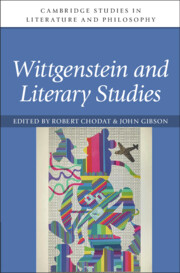Book contents
- Wittgenstein and Literary Studies
- Cambridge Studies in Literature and Philosophy
- Wittgenstein and Literary Studies
- Copyright page
- Contents
- Contributors
- Abbreviations of Wittgenstein’s Major Works
- Introduction
- 1 Writing after Wittgenstein
- 2 A Wittgensteinian Phenomenology of Criticism
- 3 Appreciating Material
- 4 A Vision of Language for Literary Historians
- 5 Wittgenstein and the Prospects for a Contemporary Literary Humanism
- 6 Storied Thoughts
- 7 Wittgenstein and Lyric
- 8 Life, Logic, Style
- 9 Wittgenstein’s Apocalyptic Subjectivity
- Index
1 - Writing after Wittgenstein
Published online by Cambridge University Press: 05 December 2022
- Wittgenstein and Literary Studies
- Cambridge Studies in Literature and Philosophy
- Wittgenstein and Literary Studies
- Copyright page
- Contents
- Contributors
- Abbreviations of Wittgenstein’s Major Works
- Introduction
- 1 Writing after Wittgenstein
- 2 A Wittgensteinian Phenomenology of Criticism
- 3 Appreciating Material
- 4 A Vision of Language for Literary Historians
- 5 Wittgenstein and the Prospects for a Contemporary Literary Humanism
- 6 Storied Thoughts
- 7 Wittgenstein and Lyric
- 8 Life, Logic, Style
- 9 Wittgenstein’s Apocalyptic Subjectivity
- Index
Summary
Since his death in 1951 and the posthumous publication of the Philosophical Investigations in 1953, Ludwig Wittgenstein’s life and work have been a subject of intense fascination for poets, novelists, and playwrights. Wittgenstein’s signature approach to writing as a mode of discovery – of writing as philosophical investigation – factors into and emerges out of the literary response to his life and work. That response takes many forms, from a quick reference or veiled allusion to parodic imitation to more extended, complex, or subtle forms of inspiration, influence, or acknowledgment. After examining a number of uses of Wittgenstein’s work in texts by mid-twentieth-century authors (Thomas Pynchon, Vladimir Nabokov, Angela Carter, Don DeLillo, Thomas Bernhard, David Markson), ones that construe the philosopher as alternately a logical positivist or a silent mystic, the chapter turns to more contemporary, twenty-first-century responses to Wittgenstein by authors including Maggie Nelson, Kathy Acker, Lydia Davis, Ben Lerner, Nicholas Mosley, W. G. Sebald, David Foster Wallace, and Amiri Baraka. These more contemporary literary responses to Wittgenstein are less uniform in their references to the man and his work but more diverse in their use of Wittgenstein’s concepts, arguments, or writings, particularly from the later philosophy.
Keywords
- Type
- Chapter
- Information
- Wittgenstein and Literary Studies , pp. 16 - 40Publisher: Cambridge University PressPrint publication year: 2023

